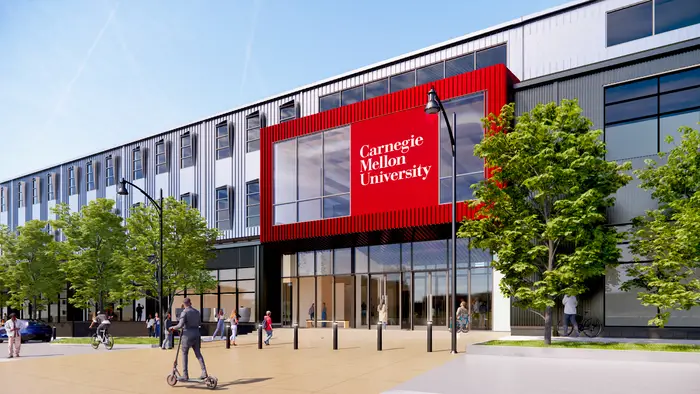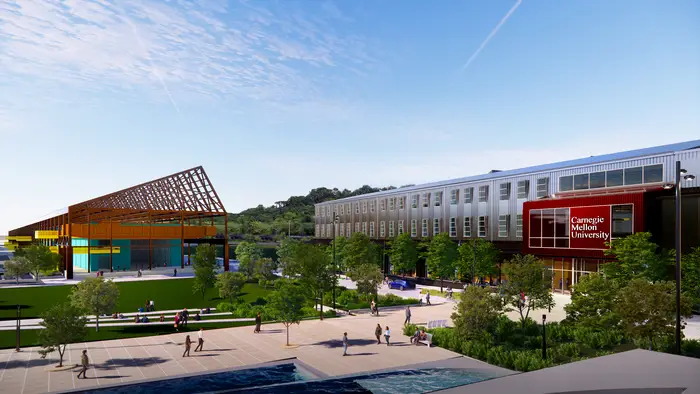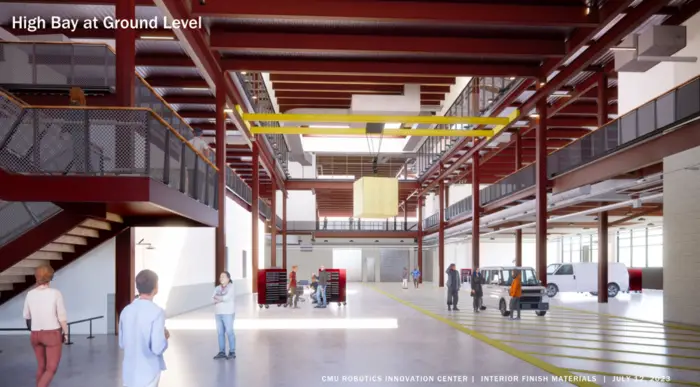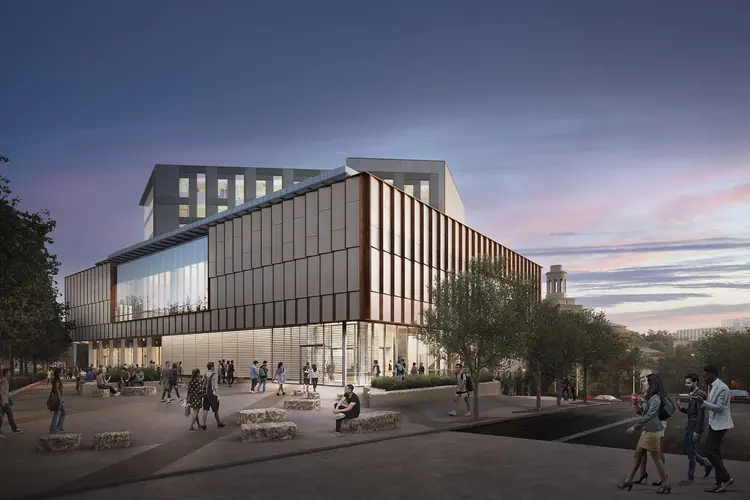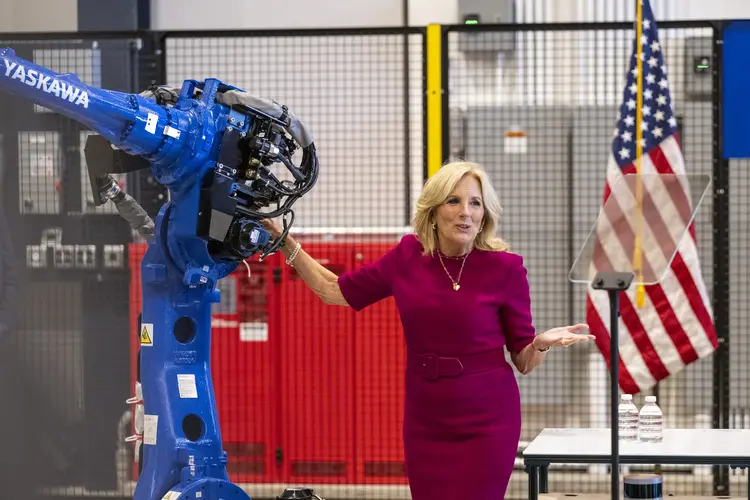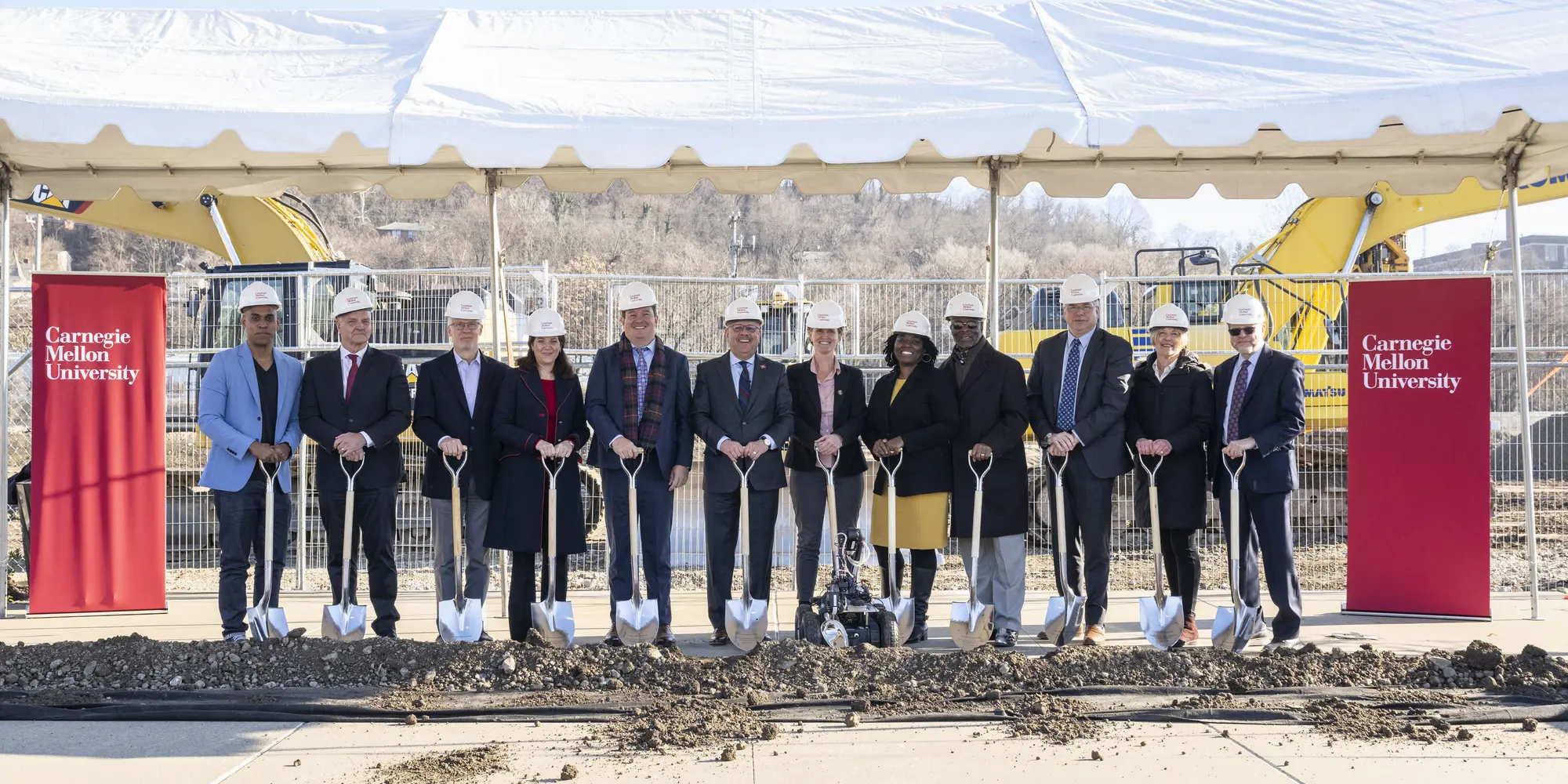
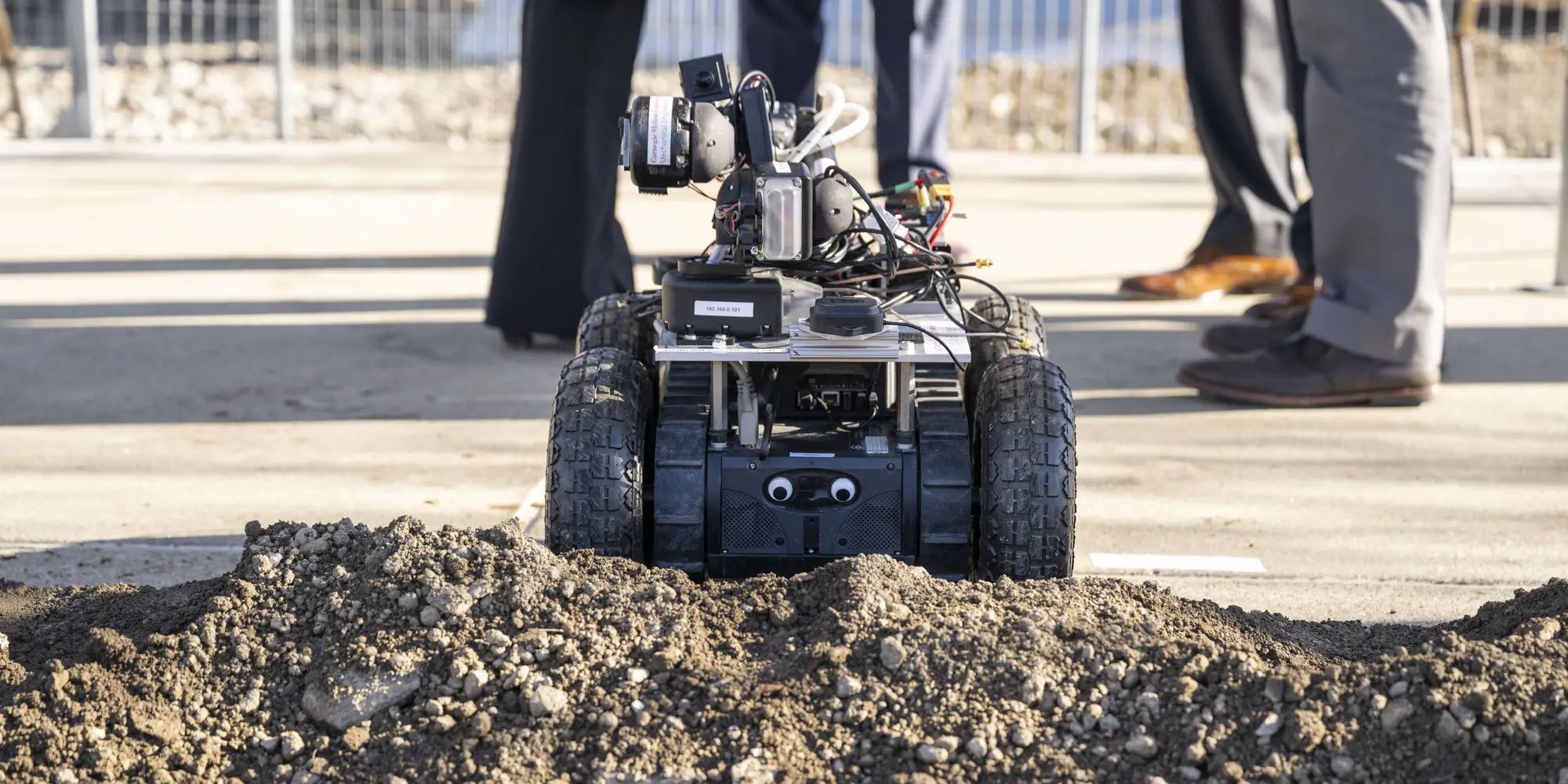
Carnegie Mellon Holds Groundbreaking for Robotics Innovation Center
Cutting-edge facility will expand research space, provide advanced capabilities
Media Inquiries
Carnegie Mellon University has broken ground on construction for its Robotics Innovation Center (RIC), a new, cutting-edge facility that will significantly expand the institution’s physical space for research, development and testing for robotics, including related fields such as artificial intelligence and automation.
Located just east of CMU’s existing facility within Mill 19 in the Hazelwood Green development in Pittsburgh, the RIC will add 150,000 square feet of research space for robots that will operate on land, in water, in the air and perhaps even beyond Earth. The various spaces for development and testing will include a 50,000-square-foot indoor robot test facility, an open-layout wet lab, reconfigurable high bays, and a 1.5-acre, large-footprint outdoor lab with a 6,000-square-foot drone cage. Construction is expected to be completed in 2025.
Members of the CMU community, civic and community leaders, and project partners gathered on Friday, Dec. 15, for the groundbreaking event, which was held within Mill 19’s high bay. In 2019, CMU’s Manufacturing Futures Institute(opens in new window) and Advanced Robotics for Manufacturing Institute(opens in new window) were among the inaugural tenants of the Regional Industrial Development Corporation’s Mill 19, the first major project at Hazelwood Green(opens in new window). The 178-acre brownfield was once the site of the Jones & Laughlin Steel Company and has become a key example of Pittsburgh’s evolution in an innovation-driven economy. It is being redeveloped by the Almono Limited Partnership with an eye on the region’s future and a vision guided by principles of sustainability, equity and inclusive economic opportunity for the project’s neighbors.
Speaking at the event, CMU President Farnam Jahanian(opens in new window) said: “Over the past generation, Pittsburgh has been making a comeback. Today, we are here to celebrate and to continue to support our region’s ongoing renaissance.”
Reflecting on the site’s importance when Pittsburgh was the global leader in steel output and the need to completely transform it following the industry’s decline, he added, “Hazelwood Green has become a model site for community collaboration and the future of manufacturing … While the product created here may be different, the ingredients that make Pittsburgh great — innovation, community and partnership — are all still the same.”
Pictured above: Participants in the RIC groundbreaking included Matthew Johnson-Roberson, Director, CMU Robotics Institute; School of Computer Science Dean Martial Hebert; Chris DeCardy, President, The Heinz Endowments; Jen Giovannitti, President and Trustee, Claude Worthington Benedum Foundation; Sam Reiman, Director and Trustee, Richard King Mellon Foundation; CMU President Farnam Jahanian; Pittsburgh City Councilmember Barb Warwick; Patrick, the robot; Sonya Tilghman, Executive Director, Hazelwood Initiative; the Rev. Michael Murray, Chair, Greater Hazelwood Community Collaborative; College of Engineering Dean Bill Sanders; CMU Trustee Anne Molloy; Mechanical Engineering Department Head Jon Cagan.
Joining the human groundbreaking participants was Patrick(opens in new window), a robot designed to explore terrain to find soils that might be contaminated.
In addition to the leading-edge research that will take place at the RIC, the building will facilitate CMU’s STEM education programs and initiatives to engage Pittsburgh-area residents, with a focus on its Greater Hazelwood neighbors. These include K-12 education programs such as Girls of Steel Robotics(opens in new window), the Robotics Academy(opens in new window) and Engineering Ambassadors(opens in new window). The RIC also will include spaces open to the community and public art displays.
Construction of the Robotics Innovation Center has been made possible by a $45 million lead grant from the Richard King Mellon Foundation(opens in new window). The Foundation also has provided a $30 million grant to expand and endow the university’s Manufacturing Futures Institute, which develops and brings to market advanced and additive manufacturing technologies. The co-location at Hazelwood Green of the RIC, MFI, the Advanced Robotics for Manufacturing Institute, Catalyst Connection(opens in new window) and the University of Pittsburgh’s BioForge Manufacturing Center is expected to create synergies and accelerate the work of researchers from multiple fields, as well as workforce development and technology integration programs that will resonate across the Pittsburgh region.
“When combined with thoughtful programs and policies to support K-12 education and workforce training, and fueled by Pittsburgh’s spirit of resiliency and self-determination, the new Robotics Innovation Center will cement Pittsburgh’s national and even world leadership in robotics,” said Sam Reiman, director and trustee of the Richard King Mellon Foundation who also serves on CMU’s Board of Trustees. “And that, in turn, will have ripple effects for Hazelwood and our entire economy.”
The site’s owner, Almono LP, is composed of the Claude Worthington Benedum Foundation, Richard King Mellon Foundation, and The Heinz Endowments. Tishman Speyer, Hazelwood Green’s master developer, is also partnering with CMU on the development of the RIC. Perkins Eastman is the project’s principal architect, and the Gilbane Mosites Joint Venture is serving as construction manager.
Support from government officials and public-private partnerships have played key roles in the successful redevelopment at Hazelwood Green and Carnegie Mellon’s investment at the site. The Advanced Robotics for Manufacturing Institute was created in 2017 through CMU’s winning bid to launch a robotics-focused Manufacturing USA Institute, and elected officials including President Joe Biden and other global leaders have visited on multiple occasions.
“The Robotics Innovation Center is — at its core — a project driven by meaningful community collaboration and Carnegie Mellon University’s record of innovation excellence,” said Allegheny County Executive-elect Sara Innamorato. “I’m excited by the economic opportunities it’s poised to bring to residents and the region — and especially to the community of Greater Hazelwood.”
Pittsburgh Councilmember Barbara Warwick said, “I've been so impressed watching the team at CMU and Tishman Speyer ... as you have taken such great care and time over many, many meetings and events to engage with Greater Hazelwood, both around the project itself and also around the broader community needs and how CMU can help.”
CMU is a member of the Greater Hazelwood Community Collaborative, a group of organizations focused on enhancing the economic, social and physical outcomes for all Greater Hazelwood residents. The university has partnered with the local community development organization, the Hazelwood Initiative, to connect with nearby residents and organizations to share plans for the RIC, discuss opportunities for community engagement and solicit feedback.
“It’s easy to see the historical parallels to the growth of the steel industry where innovations made Pittsburgh one of the most important cities in the world,” said Sonya Tilghman, executive director of the Hazelwood Initiative. “… As we stand here celebrating the RIC and the technological advancements it will bring, we can see the Robotics Innovation Center represents another opportunity for Pittsburgh and Hazelwood, in particular, to be recognized again for the amazing and critical work that happens here.”
Over the past 10 years, robotics research expenditures at CMU have nearly doubled, and are expected to double again over the next decade. Complementing the work of the university’s National Robotics Engineering Center(opens in new window) (NREC), the new facility will provide CMU robotics researchers with enhanced capacity and capabilities for foundational research, integration, iteration and commercialization that will allow discoveries to be translated into real-world technologies in fields such as health care, transportation, national security, education, agriculture and retail. It also is planned to include pre-incubator space for the next generation of CMU-affiliated robotics companies.
“CMU’s new Robotics Innovation Center will be truly transformative,” said Bill Sanders, the Dr. William D. and Nancy W. Strecker Dean of the CMU College of Engineering. “It will bring together fundamental and applied robotics and softbotics research in a dynamic and adaptive environment, working across traditional disciplinary boundaries to tackle future challenges.”
Carnegie Mellon has been the global pioneer in robotics research and education, founding the first U.S. university department devoted to the field in 1979. Last year, the university launched the first undergraduate robotics degree offered by a leading computer science program. Its Iris lunar rover, built by students, is scheduled to launch to the moon in early 2024.
“Robotics is a transformative set of technologies because it inspires people to think about how they can affect things outside themselves out there in the real world,” said Matthew Johnson-Roberson, director of CMU’s Robotics Institute. “… What I think we can do here is educate the next generation of roboticists to help us solve the world’s most challenging problems right here in Hazelwood.”
